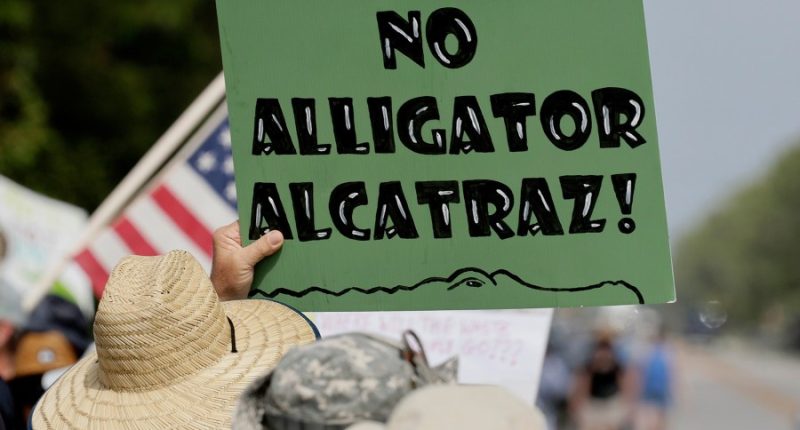Share this @internewscast.com

A diverse coalition comprising environmental activists and Native Americans advocating for the preservation of their ancestral lands rallied outside an airstrip in the Florida Everglades on Saturday. They gathered to voice their opposition to the planned construction of a new immigrant detention center.
Amid the protest, hundreds of demonstrators lined a segment of U.S. Highway 41, known as Tamiami Trail, which traverses the marshy landscape of the Everglades. This area is not only significant for its natural beauty but also as a habitat for several endangered species and home to a few Native tribes. As dump trucks carried construction materials into the site, passing motorists honked in support while protesters held signs advocating for the protection of this expansive preserve.
Ecologist Christopher McVoy, who also serves as a South Florida city commissioner, participated in the protest, witnessing a continuous flow of trucks accessing the site throughout the day. He cited environmental degradation as a central concern for his involvement, alongside apprehensions related to the impact of immigration raids on his city.
“People I know are in tears, and I wasn’t far from it,” he said.
Florida officials have forged ahead over the past week in constructing the compound dubbed as “Alligator Alcatraz” within the Everglades’ humid swamplands.
The government fast-tracked the project under emergency powers from an executive order issued by Gov. Ron DeSantis that addresses what he views as a crisis of illegal immigration. That order lets the state sidestep certain purchasing laws and is why construction has continued despite objections from Miami-Dade County Mayor Daniella Levine Cava and local activists.
The facility will have temporary structures like heavy-duty tents and trailers to house detained immigrants. The state estimates that by early July, it will have 5,000 immigration detention beds in operation.
The compound’s proponents have noted its location in the Florida wetlands — teeming with massive reptiles like alligators and invasive Burmese pythons — make it an ideal spot for immigration detention.
“Clearly, from a security perspective, if someone escapes, you know, there’s a lot of alligators,” DeSantis said Wednesday. “No one’s going anywhere.”
Under DeSantis, Florida has made an aggressive push for immigration enforcement and has been supportive of the federal government’s broader crackdown on illegal immigration. The U.S. Department of Homeland Security has backed “Alligator Alcatraz,” which DHS Secretary Kristi Noem said will be partially funded by the Federal Emergency Management Agency.
But Native American leaders in the region have seen the construction as an encroachment onto their sacred homelands, which prompted Saturday’s protest. In Big Cypress National Preserve, where the airstrip is located, 15 traditional Miccosukee and Seminole villages, as well as ceremonial and burial grounds and other gathering sites, remain.
Others have raised human rights concerns over what they condemn as the inhumane housing of immigrants. Worries about environmental impacts have also been at the forefront, as groups such as the Center for Biological Diversity and the Friends of the Everglades filed a lawsuit Friday to halt the detention center plans.
“The Everglades is a vast, interconnected system of waterways and wetlands, and what happens in one area can have damaging impacts downstream,” Friends of the Everglades executive director Eve Samples said. “So it’s really important that we have a clear sense of any wetland impacts happening in the site.”
Bryan Griffin, a DeSantis spokesperson, said Friday in response to the litigation that the facility was a “necessary staging operation for mass deportations located at a preexisting airport that will have no impact on the surrounding environment.”
Until the site undergoes a comprehensive environmental review and public comment is sought, the environmental groups say construction should pause. The facility’s speedy establishment is “damning evidence” that state and federal agencies hope it will be “too late” to reverse their actions if they are ordered by a court to do so, said Elise Bennett, a Center for Biological Diversity senior attorney working on the case.
The potential environmental hazards also bleed into other aspects of Everglades life, including a robust tourism industry where hikers walk trails and explore the marshes on airboats, said Floridians for Public Lands founder Jessica Namath, who attended the protest. To place an immigration detention center there makes the area unwelcoming to visitors and feeds into the misconception that the space is in “the middle of nowhere,” she said.
“Everybody out here sees the exhaust fumes, sees the oil slicks on the road, you know, they hear the sound and the noise pollution. You can imagine what it looks like at nighttime, and we’re in an international dark sky area,” Namath said. “It’s very frustrating because, again, there’s such disconnect for politicians.”

















